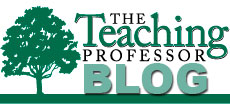 Students don’t always like working in groups. Ann Taylor, an associate professor of chemistry at Wabash College, had a class that was particularly vocal in their opposition. She asked for their top 10 reasons why students don’t want to work in groups and they offered this list (which I’ve edited slightly).
Students don’t always like working in groups. Ann Taylor, an associate professor of chemistry at Wabash College, had a class that was particularly vocal in their opposition. She asked for their top 10 reasons why students don’t want to work in groups and they offered this list (which I’ve edited slightly).
CURRENT ARTICLE • February 22
OTHER RECENT ARTICLES
I started thinking about the topic of points distribution when I wondered in a previous blog whether the 5 or 10% that many of us give for participation was enough to motivate students, or whether being such a small part of the grade, it actually devalued what students contribute in class. Since then I’ve been thinking more about how we decide on the allocation of points or percentages for the various assignments students complete in a course. For many of us (that includes me), it isn’t as thoughtful of a process as it should be. Rather, we do what we’ve done before, or we ask around, get a general sense of what everybody else is doing and follow suit.
Read More ›I recently revisited something I have always considered a great resource. It originally appeared in a 1992 issue of The Teaching Professor and was published then as a Study Group Member’s Bill of Rights. It outlined what individuals had the right to expect when they participated in study groups. Students not only have rights, they also have responsibilities. Those rights and responsibilities are relevant in any group activity used to accomplish educational goals. The version below attempts to capture those larger expectations and duties.
Read More ›For me examples are like pictures; worth a 1,000 words. In last week's post I wrote about the need to intervene in the development of student self-assessment skills, leaving the process less to chance and making it more the result of purposeful intervention. At a recent Teaching Professor Workshop, I saw an assignment that illustrates that kind of intervention. It was from a 100-level, Introduction to U.S. Government course, but is adaptable to any course. The assignment has two parts and they are the first and last pieces of work students complete in the course.
Read More ›Our interest in more learner-centered instruction has changed the way many of us think about teaching as well as what we do in the classroom. We are devoting more energy to getting students involved during class. We are trying to give them more opportunities to practice those learning skills that expedite learning. We let them summarize the content; rather than doing it for them. We try to have them ask more questions than we do. We design activities which encourage them to learn from and with each other.
Read More ›It’s a new year and a new semester, with new courses and different students—along with perhaps a few favorite courses and students you get to spend time with all over again, and maybe a couple of each you won’t miss at all. In other words, it’s a new beginning.
Read More ›We all have our favorite authors … of course, most of mine write about teaching and learning. I read everything I can find written by my favorites and they remain favorites because their writing seldom disappoints. Peter J. Frederick, a history professor at Wabash College—he may be retired by now—is one of my favorite authors.
Read More ›One of the enduring legacies of the classroom assessment movement (thank you Pat Cross and Tom Angelo) is that most faculty now realize that if they want to know how well something worked to promote learning in the classroom, they can’t just rely on what they think. They need to support what they think with feedback from students and, if that feedback doesn’t agree with what they think, they need to listen carefully to what the students said.
Read More ›Fall is slipping into winter here at the farm in Pennsylvania … no real cold yet, but hints of what’s to come. The leaves are down and things are mostly brown. It’s a quiet time.
Read More ›I’ve been thinking about critical thinking. I just finished reading Stephen Brookfield’s new book on the topic, Teaching for Critical Thinking. (Side note: Stephen is a prolific author, writing on a variety of teaching-learning topics and his work has generated a number of classics including The Skillful Teacher, Discussion as a Way of Teaching, co-authored with Stephen Preskill, and Becoming a Critically Reflective Teacher. If you don’t know his work, by all means add it to your reading list). My recent journal reading contained a couple of interesting articles on critical thinking as well.
Read More ›




